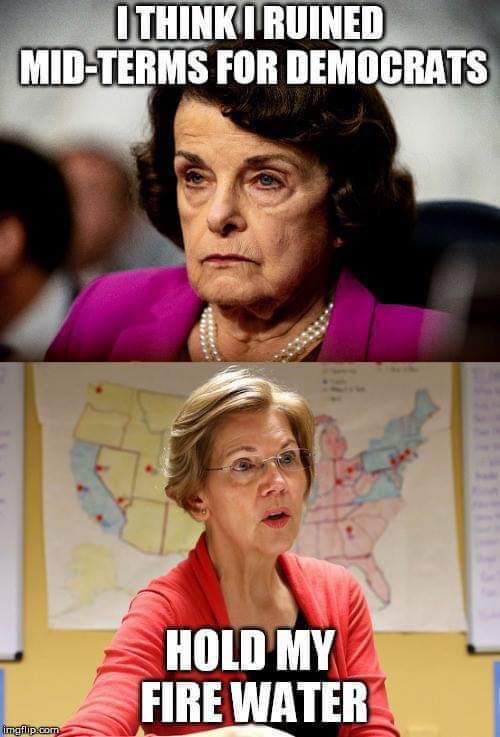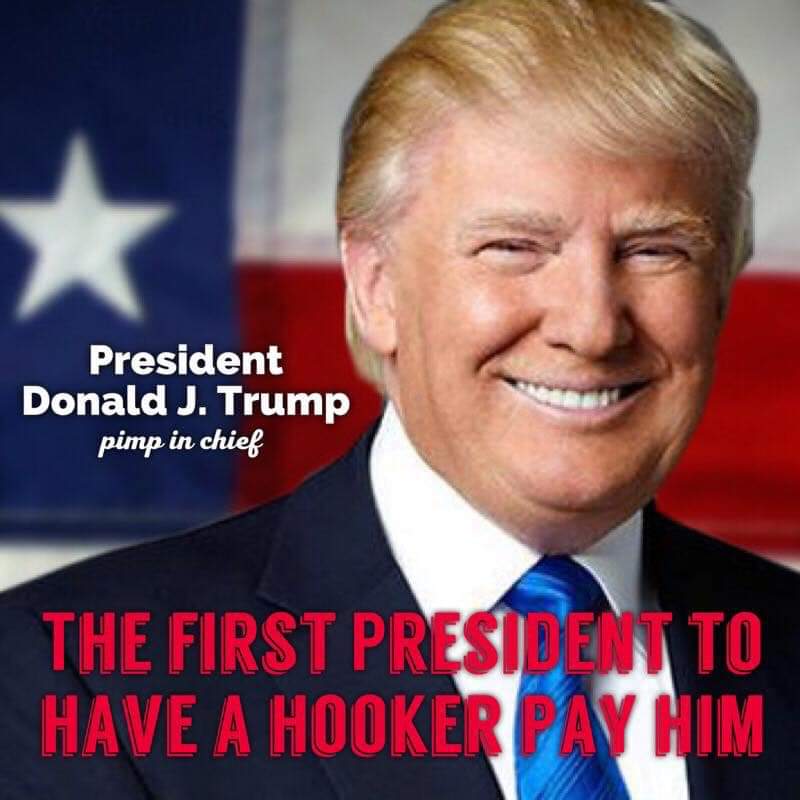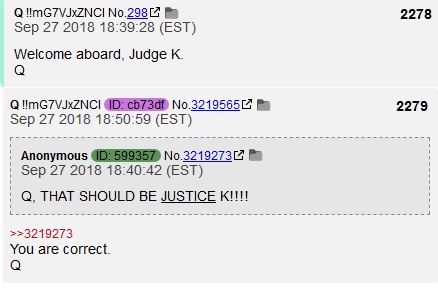It looks like you're using an Ad Blocker.
Please white-list or disable AboveTopSecret.com in your ad-blocking tool.
Thank you.
Some features of ATS will be disabled while you continue to use an ad-blocker.
share:
originally posted by: IAMTAT
originally posted by: Quadrivium
originally posted by: IAMTAT
BREAKING: Carter Page just sued the DNC!
www.thegatewaypundit.com...
This isn't like the Trump/antifa vid? .......
Nope looks light.
Thanks TAT
STORMY D., WARREN...NOW DNC SUED BY CARTER PAGE!
This day just keeps getting better and better!
And, George Papadopoulos is preparing to take Legal Action(s) too! He's been on a "tweet storm" today.
Link: twitter.com...
As he said in another tweet tonight, October is going to be a NIGHTMARE for the SPYGATE perpetrators.
Re 4D chess - Here's an interesting screen grab from the BBC home page tonight regarding the Brexit impasse:
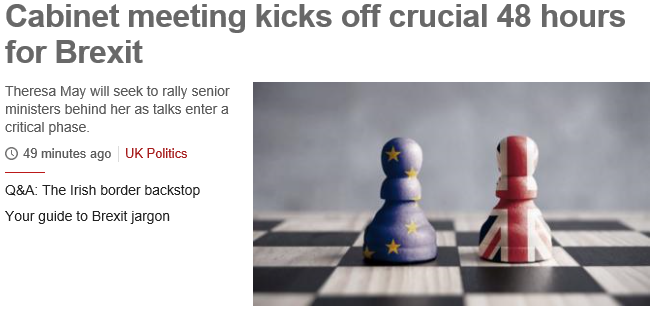
Note how both the U.K. and European Union are depicted as pawns in the game!!!

Note how both the U.K. and European Union are depicted as pawns in the game!!!
Not sure if this has been reported in the U.S. but Microsoft co-founder Paul Allen
dies.
Apparently most of his fortune will go to charity... I guess that means selling any remaining Microsoft or Vulcan shares. Could this impact Microsoft share price negatively?
Apparently most of his fortune will go to charity... I guess that means selling any remaining Microsoft or Vulcan shares. Could this impact Microsoft share price negatively?
For all those who are tossing back a cold one, I just want to supply you with a bit of music. have a nice night, y'all.
Good night...
Good night...
edit on AMTuesdayTuesday thAmerica/ChicagoAmerica/Chicago031012 by All Seeing Eye because: (no reason given)
originally posted by: carewemust
a reply to: LurkNoMore
Hiding on a yacht isn't too smart. A floating target, in plain sight.

Jamal Khashoggi: Mike Pompeo to visit Saudi Arabia
US Secretary of State Mike Pompeo is to meet Saudi King Salman amid growing controversy over the fate of Saudi journalist Jamal Khashoggi.
He will then visit Turkey, where Mr Khashoggi was last seen at the Saudi consulate in Istanbul two weeks ago.
Turkish officials believe Mr Khashoggi was murdered by Saudi agents but Riyadh has always strongly denied this.
On Monday, President Donald Trump suggested "rogue killers" could be behind Mr Khashoggi's disappearance.
The president provided no evidence to back his comment, but said that during a phone call the Saudi king had firmly denied knowing what had happened to Mr Khashoggi.
So wait have they found a body? What we know is Khashoggi was last seen entering Saudi consulate then nada. Private planes leave with body back to SA...? I’m really hoping white hats scooped him up and he is not 187.
a reply to: LurkNoMore
I'm getting the vibe that Pompeo was sent over for the big reveal where they will show Kashoggi is alive and parade the 15 perps who TRIED to kill him - together with their links to Al Waleed.
I'm getting the vibe that Pompeo was sent over for the big reveal where they will show Kashoggi is alive and parade the 15 perps who TRIED to kill him - together with their links to Al Waleed.
I'm researching the list of Rothschild owned banks given to us by Q across posts #135 to 138 on
qntmpkts.keybase.pub:
I've been plotting their foundation dates and grouping them around world events at the time... more to follow in a separate post.
However, I thought I'd share info on this interesting man (I almost put gentleman), who started paper money in Europe!
Johann Wittmacher :
This is the first paper money from 1666:
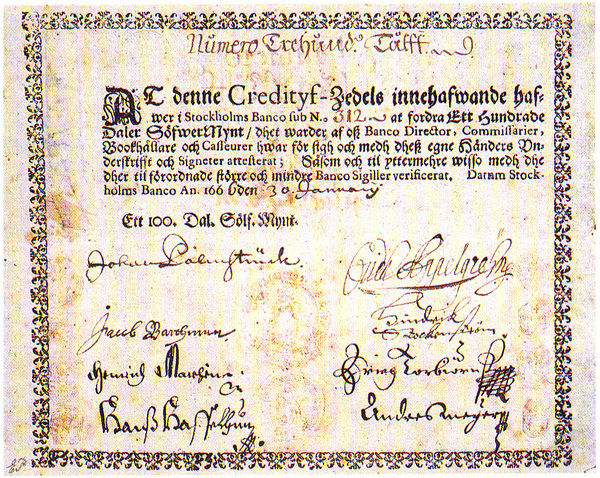
I've been plotting their foundation dates and grouping them around world events at the time... more to follow in a separate post.
However, I thought I'd share info on this interesting man (I almost put gentleman), who started paper money in Europe!
Johann Wittmacher :
Johan Palmstruch (1611 in Riga – 1671 in Stockholm; named Johan Wittmacher before he was ennobled) was a Latvian-born Dutch entrepreneur, financier, and financial innovator. He is often credited with the introduction of paper money to Europe. He became a commissioner in the National Board of Trade after his arrival in Sweden in 1647 and began submitting proposals for banking institutions to King Charles X Gustav in the 1650s. The first two such proposals were rejected but the third, which promised half the bank's profits to the crown, was accepted.
The first paper money in Europe (1666).
Stockholms Banco was thus founded in 1657 with Palmstruch appointed as general manager. The bank itself was nothing new as it was simply an imitation of the successful public deposit banks of Amsterdam and Hamburg, however Palmstruch himself added two important innovations. The first of these was to use money deposited into accounts at the bank to finance loans, however this soon became a problem as the deposits were usually short-term and the loans long-term, meaning that deposited money was unavailable to be withdrawn by account holders. Palmstruch's second innovation, and his solution to this problem, was the introduction in 1661 of Kreditivsedlar ("credit paper"), the first European banknotes, which would be exchangeable at any time for the gold and silver coins they were replacing.[1] These were very successful, but the bank began lending more than it could afford and printed too many banknotes without the necessary collateral, leading to the bank's collapse in 1668.
Palmstruch was charged with irresponsible book-keeping and with not having the cash to repay these credit notes due to miscalculation and omissions in his book-keeping. He was unable to make up this shortage and in 1668 was sentenced to loss of his title, loss of his banking privilege, and eternal exile or death. The government reprieved the death penalty and Palmstruch was instead imprisoned. He remained in prison until 1670 and died the following year at the age of 60.
This is the first paper money from 1666:

edit on 16-10-2018 by RelSciHistItSufi because: (no reason given)
a reply to: LurkNoMore
American-Saudi Journalist Khashoggi may have been tortured. Turkish investigators were not allowed in to the Saudi consulate until today. After 9 hours they came out with soils samples from an interior garden, and a steel door. Loaded everything in a truck and left.
www.channelnewsasia.com...
Why the steel door? Torture related perhaps?
American-Saudi Journalist Khashoggi may have been tortured. Turkish investigators were not allowed in to the Saudi consulate until today. After 9 hours they came out with soils samples from an interior garden, and a steel door. Loaded everything in a truck and left.
www.channelnewsasia.com...
Why the steel door? Torture related perhaps?
edit on 10/16/2018 by carewemust because: (no reason given)
Looking into In-Q-Tel some more I ran across some very shady people.
Christopher Darby - Pres and CEO
Steve Bowsher - General Partner
Matthew Strotman - COO
Lisbeth Poulos - Chief of Staff
Teresa Shae - EVP IQT Technology
Dr. Tara O'Toole - EVP
Mike Vickers - EVP
Bruce Adams - Legal and General Counsel
BOARD OF TRUSTEES
Michael M. Crow, Chairman of the Board
James L. Barksdale
Peter Barris
Howard Cox
Chris Darby
Anita K. Jones
A.B. "Buzzy" Krongard
David McCormick
Jami Miscik
Admiral Mike Mullen
Ted Schlein
Jeffrey H. Smith
George Tenet
Michael (Mike) Vickers is openly hostile towards Potus. He wrote this article[/url ] back in July 2016. Those who scream the loudest!
Mr Vickers is on the board of directors for [url=https://www.baesystems.com/en-us/our-company/about-us/bae-systems-inc/inc-board-of-directors/michael-g-vickers]BAE Systems.
This article provides more info on Vickers.
BCG hasn't updated their leadership page. Looking for that info to link I ran across this little gem.
Board Members
Willem de Vogel
Chairman
Matthew Bryza
Michael Carpenter
Nancy Ellison
James Gidwitz
Patrick W. Gross
Gen. Michael Hayden
Bruce Hoffman
Michael E. Kavoukjian
Adm. Timothy Keating
John P. Oswald
William B. Richards
Scott Robins
William D. Rollnick
Clinton I. Smullyan
Robert Spring
Michelle Van Cleave
Michael Vickers
Arthur Waldron
SAIS board members
Christopher Darby - Pres and CEO
Steve Bowsher - General Partner
Matthew Strotman - COO
Lisbeth Poulos - Chief of Staff
Teresa Shae - EVP IQT Technology
Dr. Tara O'Toole - EVP
Mike Vickers - EVP
Bruce Adams - Legal and General Counsel
BOARD OF TRUSTEES
Michael M. Crow, Chairman of the Board
James L. Barksdale
Peter Barris
Howard Cox
Chris Darby
Anita K. Jones
A.B. "Buzzy" Krongard
David McCormick
Jami Miscik
Admiral Mike Mullen
Ted Schlein
Jeffrey H. Smith
George Tenet
Michael (Mike) Vickers is openly hostile towards Potus. He wrote this article[/url ] back in July 2016. Those who scream the loudest!
Why Trump Fails—and Clinton Passes—the Commander-in-Chief Test
“I’m with her,” says one of America’s leading intelligence and special operations officials, because the GOP nominee’s views put the nation at risk.
Mr Vickers is on the board of directors for [url=https://www.baesystems.com/en-us/our-company/about-us/bae-systems-inc/inc-board-of-directors/michael-g-vickers]BAE Systems.
Inc. Board of Directors
Michael Chertoff
Jerry DeMuro
Charles Woodburn
Peter Lynas
Ian T. Graham
Frank Ruggiero
Kelly A. Ayotte
John F. Campbell
Jonathan W. Greenert
Ellen O. Tauscher
Michael G. Vickers
This article provides more info on Vickers.
Currently, he is a senior advisor to the Boston Consulting Group and a senior fellow at Johns Hopkins Paul H. Nitze School of Advanced International Studies and the Center for Strategic and International Studies.
BCG hasn't updated their leadership page. Looking for that info to link I ran across this little gem.
The Jamestown Foundation is proud to announce the addition of three new members to its Board of Directors: former Deputy Assistant Secretary of Defense Michael Carpenter, Virtual Procurement Services CEO Scott Robins, as well as former Under Secretary of Defense for Intelligence Michael Vickers.
Board Members
Willem de Vogel
Chairman
Matthew Bryza
Michael Carpenter
Nancy Ellison
James Gidwitz
Patrick W. Gross
Gen. Michael Hayden
Bruce Hoffman
Michael E. Kavoukjian
Adm. Timothy Keating
John P. Oswald
William B. Richards
Scott Robins
William D. Rollnick
Clinton I. Smullyan
Robert Spring
Michelle Van Cleave
Michael Vickers
Arthur Waldron
Founded in 1984, The Jamestown Foundation is an independent, non-partisan research institution dedicated to providing timely information concerning critical political and strategic developments in China, Russia, Eurasia and the world of terrorism. Jamestown produces three periodic publications: Eurasia Daily Monitor, Terrorism Monitor and China Brief.
SAIS board members
Todd A. Fisher ’91, CHAIR Fellow Advanced Leadership Initiative, Harvard University Kathleen M. Pike B’81, JHU’82, JHU’83, VICE-CHAIR Professor of Psychology Executive Director and Scientific Co-Director, Global Mental Health Program Columbia University Robert J. Abernethy JHU’62 President American Standard Development Co. David H. Bernstein JHU’57 Consultant Carisam-Samuel Meisel Inc. Ludovico Feoli Executive Director Center for Inter-American Policy & Research Tulane University Pamela P. Flaherty ’68 Former President and Chief Executive Officer Citi Foundation Peter A. Flaherty B’67, ’68 Managing Director Arcon Partners, LLC Louis J. Forster JHU’82, ’83 Partner Green Visor Capital Jesse Friedlander '02 Co-Founder and Chief Investment Officer DesVoeux Partners David T. Fuhrmann ’82 Partner/Owner Glenwood, LLC Richard P. Gildea B’83, ’84 Former Managing Director (Retired) J.P. Morgan John Graham ’79 Chief Executive Officer Liminal Partners Ltd. Timothy J. Jennison '91 Partner and Managing Director The Boston Consulting Group Edward P. Joseph '81 Senior Fellow and Professional Lecturer Johns Hopkins School of Advanced International Studies Executive Director National Council on US-Libya Relations Marijke Jurgens-Dupree '92 Lee S. Kempler ’91 Chief Operating Officer for Investments BlueMountain Capital Management Joanne Leedom-Ackerman JHU’69 Writer Deborah M. Lehr Chief Executive Officer Basilinna Joseph E. Lipscomb ’91 Co-Founder and Partner Arborview Capital Dennis Lockhart '71 Senior Fellow Mossavar-Rahmani Center for Business and Government, Harvard Kennedy School Distinguished Professor-of-the-practice Sam Nunn School of International Affairs, Georgia Tech Principal Navigation Capital Partners Elizabeth Madigan Jost B'97, '98 Chief Operating Officer Morgan Stanley Latin America Jill McGovern President, M&M Enterprises Senior Consultant American Institute for Contemporary German Studies Johns Hopkins University Richard R. Nijkerk '89 Director Nijvest Asia, Nijkerk Group Ned S. Offit JHU’87, ’93 Co-Chief Executive Officer Offit Capital L. Peter O’Hagan ’87 Managing Director The Carlyle Group Sarah B. O'Hagan '86 Co-Chair International Rescue Committee Sara O'Rourke '13 Associate Partner McKinsey & Company Frank Savage ’64 Chief Executive Officer Savage Holdings, LLC George Siguler Managing Director Siguler Guff & Company LP Gary M. Talarico ’83 Managing Partner Cora Street Partners Thomas B. Tesluk B’81, ’82 Owner and Managing Director Sequent Consulting, LLC Michael D. White '76 Former Chairman and CEO DIRECTV
CSIS board of trustees
What a list of who's who!
CSIS wrote this report Oct. 11 2018. The authors are as follows.
Michael J. Green - Senior Vice President for Asia and Japan Chair.
Bonnie S. Glaser is a member of the Council on Foreign Relations.
Christopher K. Johnson worked as a senior China analyst at the Central Intelligence Agency.
Amy Searight served in the Department of Defense (DOD) as deputy assistant secretary of defense for South and Southeast Asia, from 2014 to 2016. Prior to that appointment, she served as principal director for East Asian security at DOD and as senior adviser for Asia in the U.S. Agency for International Development (USAID). She has also served on the policy planning staff and as special adviser for Asia Pacific Economic Cooperation (APEC) in the State Department as a Council on Foreign Relations international affairs fellow.
Murray Hiebert was a journalist in the China bureau of the Wall Street Journal. Prior to his posting to Beijing, he worked for the Wall Street Journal Asia and the Far Eastern Economic Review in Washington, reporting on U.S.-Asia relations. From 1995 to 1999, he was based in Kuala Lumpur for the Far Eastern Economic Review. In the early 1990s, he was based in Hanoi for the Review.
Brian Harding served as director for East and Southeast Asia policy at the Center for American Progress. Hey Skippy!
I also found Vickers sits on the advisory board of Beacon Global Strategies
Jeremy Bash - Founding & Managing Director
Andrew Shapiro - Founder & Managing Director
Michael Allen - Managing Director
Leon Panetta - Senior Counselor
Michael Morrell - " "
Ashley Barry - Ex. Asst.
Lauren Bedula - VP
Derek Chollet - Advisor
Eric Edelman - Advisory Board
Jamie Fly - Advisor
Kaitlyn Garman - Sr. Associate
Joshua Grelle - Bus. Dev. Analyst
Andrew Hire - VP & Technical Advisor
Jamil Jaffer - Advisor
Sec. Deborah Lee James - Advisory Board
John Kirshner - Sr. VP
Jeffrey Kupfer - Advisor
Sahana Kumar - Associate
Mark Lampkin - Advisory Board
Richard H. Ledgett Jr. - Advisory Board
Alex Rued - Sr. Associate
Terry Rydz - Sr. Associate
Eric Sayers - VP
David Shedd - Advisory Board
Kristen Silverberg - Advisory Board
Mark Simakovsky - VP
Bryan Smith - Technical Advisor
Julianne Smith - Sr. VP
Adm. James Stavridis - Advisory Board
Frances Townsend - Advisory Board
Kristin White - COO
Adm. Sandy Winnefeld - Advisory Board
Michael Vickers - Advisory Board
Mr Vickers is also on the advisory board of SAP National Security Services.
Advisory Board
Michael Vickers, Chairman
Michael J. Morell, Founding Chairman
Jack Devine
President, The Arkin Group, LLC
Michael W. Hewitt
Founder and Senior Partner of HSH Analytics
Joe Maguire
President and CEO, Special Operations Warrior Foundation
Alan Wade
Former CIO of the Central Intelligence Agency
Austin Yerks
President and Founder of AJY III
Thomas J. Pritzker, Chairman & CEO, The Pritzker Organization, LLC
Chairman Emeritus
Sam Nunn, Cochairman, Nuclear Threat Initiative
President & CEO
John J. Hamre, President & CEO, CSIS
Trustees
Richard Armitage, President, Armitage International
Brendan Bechtel, Chairman and CEO, Bechtel Group, Inc.
Othman Benjelloun,* President and CEO, BMCE Bank
Erskine Bowles, President Emeritus, University of North Carolina
William E. Brock, Counselor and Trustee, CSIS
Harold Brown, Counselor and Trustee, CSIS
Sue M. Cobb, Principal, Cobb Partners, LLC and former U.S. Ambassador to Jamaica
William S. Cohen, Chairman and CEO, The Cohen Group
Lester Crown,* Chairman, Henry Crown and Company
William Daley, Managing Partner and Head of U.S. Operations, Argentière Capital
Andreas C. Dracopoulos, Co-President, Stavros Niarchos Foundation
Stanley F. Druckenmiller, Chairman and CEO, Duquesne Family Office, LLC
Jonathan B. Fairbanks, Founder and Partner, Global Energy Capital
Michael P. Galvin, President, Galvin Enterprises, Inc.
Helene Gayle, President and CEO, The Chicago Community Trust
Maurice R. Greenberg, Chairman and CEO, C.V. Starr & Company, Inc.
John H. Hammergren, Chairman, President, and CEO, McKesson Corporation
Linda W. Hart, Vice Chairman, President, and CEO, Hart Group, Inc.
Benjamin W. Heineman Jr., Trustee and Distinguished Senior Adviser, CSIS
John B. Hess, CEO, Hess Corporation
Carla A. Hills, Chair and CEO, Hills & Company
Ray Hunt, Executive Chairman, Hunt Consolidated, Inc.
James L. Jones Jr., President and CEO, Jones Group International
William T. Keevan, Senior Advisor, Chess Consulting LLC
Fred Khosravi, Cofounder and Managing Director, Incept LLC
Ronald Kirk, Senior Of Counsel, Gibson, Dunn & Crutcher
Henry A. Kissinger, Counselor and Trustee, CSIS
Kenneth G. Langone, Founder and CEO, Invemed Associates, LLC
Howard Leach,* President, Leach Capital LLC
Donald B. Marron, Founder and Chairman, Lightyear Capital
W. James McNerney Jr., Former Chairman, The Boeing Company
Joseph S. Nye Jr., University Distinguished Service Professor, John F. Kennedy School of Government, Harvard University
Leon Panetta, Chairman, The Panetta Institute for Public Policy
William K. Reilly, Chairman Emeritus, World Wildlife Fund
Charles A. Sanders, Chairman Emeritus, Project HOPE
Bob Schieffer, Former Moderator, Face the Nation, CBS; and Former CBS News Chief Washington Correspondent
Andrew C. Taylor, Executive Chairman, Enterprise Holdings, Inc
Frances F. Townsend, Executive Vice President, MacAndrews and Forbes Incorporated
Byron D. Trott, Founder, Chairman, and CEO, BDT & Company
Romesh Wadhwani, Founder, Chairman, and CEO, Symphony Technology Group
Darren W. Woods, Chairman and CEO, ExxonMobil Corporation
*Honorary Trustee
Trustee Emeritus
Brent Scowcroft, President, The Scowcroft Group
What a list of who's who!
CSIS wrote this report Oct. 11 2018. The authors are as follows.
Defusing the South China Sea Disputes
The CSIS Expert Working Group on the South China Sea brings together prominent experts on maritime law, international relations, and the marine environment from China, Southeast Asia, and beyond. The members seek consensus on realistic, actionable steps that claimants and interested parties could take to boost cooperation and manage tensions at sea. The group meets regularly to discuss issues that it considers necessary for the successful management of the South China Sea disputes and produces blueprints for a path forward on each.
Michael J. Green - Senior Vice President for Asia and Japan Chair.
In August 2016, Green was one of fifty senior G.O.P. national security officials who signed a letter saying they will not vote for Donald Trump, the Republican nominee for president.[2]
Bonnie S. Glaser is a member of the Council on Foreign Relations.
Christopher K. Johnson worked as a senior China analyst at the Central Intelligence Agency.
Amy Searight served in the Department of Defense (DOD) as deputy assistant secretary of defense for South and Southeast Asia, from 2014 to 2016. Prior to that appointment, she served as principal director for East Asian security at DOD and as senior adviser for Asia in the U.S. Agency for International Development (USAID). She has also served on the policy planning staff and as special adviser for Asia Pacific Economic Cooperation (APEC) in the State Department as a Council on Foreign Relations international affairs fellow.
Murray Hiebert was a journalist in the China bureau of the Wall Street Journal. Prior to his posting to Beijing, he worked for the Wall Street Journal Asia and the Far Eastern Economic Review in Washington, reporting on U.S.-Asia relations. From 1995 to 1999, he was based in Kuala Lumpur for the Far Eastern Economic Review. In the early 1990s, he was based in Hanoi for the Review.
Brian Harding served as director for East and Southeast Asia policy at the Center for American Progress. Hey Skippy!
I also found Vickers sits on the advisory board of Beacon Global Strategies
Jeremy Bash - Founding & Managing Director
Andrew Shapiro - Founder & Managing Director
Michael Allen - Managing Director
Leon Panetta - Senior Counselor
Michael Morrell - " "
Ashley Barry - Ex. Asst.
Lauren Bedula - VP
Derek Chollet - Advisor
Eric Edelman - Advisory Board
Jamie Fly - Advisor
Kaitlyn Garman - Sr. Associate
Joshua Grelle - Bus. Dev. Analyst
Andrew Hire - VP & Technical Advisor
Jamil Jaffer - Advisor
Sec. Deborah Lee James - Advisory Board
John Kirshner - Sr. VP
Jeffrey Kupfer - Advisor
Sahana Kumar - Associate
Mark Lampkin - Advisory Board
Richard H. Ledgett Jr. - Advisory Board
Alex Rued - Sr. Associate
Terry Rydz - Sr. Associate
Eric Sayers - VP
David Shedd - Advisory Board
Kristen Silverberg - Advisory Board
Mark Simakovsky - VP
Bryan Smith - Technical Advisor
Julianne Smith - Sr. VP
Adm. James Stavridis - Advisory Board
Frances Townsend - Advisory Board
Kristin White - COO
Adm. Sandy Winnefeld - Advisory Board
Michael Vickers - Advisory Board
Mr Vickers is also on the advisory board of SAP National Security Services.
Advisory Board
Michael Vickers, Chairman
Michael J. Morell, Founding Chairman
Jack Devine
President, The Arkin Group, LLC
Michael W. Hewitt
Founder and Senior Partner of HSH Analytics
Joe Maguire
President and CEO, Special Operations Warrior Foundation
Alan Wade
Former CIO of the Central Intelligence Agency
Austin Yerks
President and Founder of AJY III
edit on 2am1016America/ChicagoTue, 16 Oct 2018 04:31:13 -0500311042018-10-16T04:31:13-05:00 by wanderingconfusion because: (no reason
given)
Board of Directors
Frances Fragos Townsend, Chair
H. Lowell Brown
William P. Crowell
[ex]A former Assistant United States Attorney for the District of Columbia and an Assistant General Counsel of the Commodity Futures Trading Commission, Brown was Assistant General Counsel of Northrop Grumman Corporation from 1991-2000. Crowell held a series of senior positions in operations, strategic planning, research and development in the National Security Agency. He served as Deputy Director of Operations from 1991 to 1994, running its core signals intelligence mission. In February 1994, he was appointed as the Deputy Director of NSA and served in that post until his retirement in September 1997. In April 1999, Crowell was appointed to the President's Export Council (PEC), which advised the administration on trade and export policy. After 9/11, Cowell served on the Markle Foundation Task Force on National Security in the Information Age, which published three landmark studies on homeland security and information sharing. He has also served on numerous panels to investigate and improve military command and control, intelligence and security systems. In August 2007, he was named Chairman of the Director of National Intelligence (DNI) Senior Advisory Group.
William T. Vinson
Other Directors:
Mark Testoni
Robert Butler
Circling back to William Crowell he worked on the Markle Foundation Task Force (2 seperate links). Cheryl Mills is a member of Markle Economic Future Initiative which is a project of the Markle Foundation. Rel made a post about Gilman Louie here (not sure how I missed that). Previous research shows that Phillip Zelikow is a managing director of MF.
Philip is a group member of The Aspen Institute along with Chinasten, Frances Townsend, Michael Green, and other shady characters.
Other members of the Markle Foundation Task Force are Corey Booker & Gavin Newsom.
There has been 3 previous threads made about In-Q-Tel. 2007, 2008, & 2012. These threads have some great info.
Frances Fragos Townsend, Chair
is the Executive Vice President at MacAndrews and Forbes Holdings, Inc. Townsend was a corporate partner at the law firm of Baker Botts, LLP.
Previously, Townsend served as Assistant to President George W. Bush for Homeland Security and Counterterrorism and chaired the Homeland Security Council from May 2004 until January 2008. Moreover, she spent 13 years at the U.S. Department of Justice under the administrations of President George H. W. Bush, President Bill Clinton, and President George W. Bush. Currently, Townsend is an on-air contributor for CNN as an expert on counterterrorism, national security, and homeland security.
H. Lowell Brown
William P. Crowell
[ex]A former Assistant United States Attorney for the District of Columbia and an Assistant General Counsel of the Commodity Futures Trading Commission, Brown was Assistant General Counsel of Northrop Grumman Corporation from 1991-2000. Crowell held a series of senior positions in operations, strategic planning, research and development in the National Security Agency. He served as Deputy Director of Operations from 1991 to 1994, running its core signals intelligence mission. In February 1994, he was appointed as the Deputy Director of NSA and served in that post until his retirement in September 1997. In April 1999, Crowell was appointed to the President's Export Council (PEC), which advised the administration on trade and export policy. After 9/11, Cowell served on the Markle Foundation Task Force on National Security in the Information Age, which published three landmark studies on homeland security and information sharing. He has also served on numerous panels to investigate and improve military command and control, intelligence and security systems. In August 2007, he was named Chairman of the Director of National Intelligence (DNI) Senior Advisory Group.
William T. Vinson
assisted many major corporations in acquisition and corporate governance matters. Vinson retired in 1998 as the Vice President and Chief Counsel of the Lockheed Martin Corporation. He previously served as Vice President and General Counsel of Lockheed Corporation (1992) and prior to that as Vice President-Secretary and Assistant General Counsel of Lockheed Corporation (1990).
Other Directors:
Mark Testoni
Robert Butler
Circling back to William Crowell he worked on the Markle Foundation Task Force (2 seperate links). Cheryl Mills is a member of Markle Economic Future Initiative which is a project of the Markle Foundation. Rel made a post about Gilman Louie here (not sure how I missed that). Previous research shows that Phillip Zelikow is a managing director of MF.
PHILIP ZELIKOW JOINS MARKLE FOUNDATION AS VISITING MANAGING DIRECTOR
Philip is a group member of The Aspen Institute along with Chinasten, Frances Townsend, Michael Green, and other shady characters.
Other members of the Markle Foundation Task Force are Corey Booker & Gavin Newsom.
There has been 3 previous threads made about In-Q-Tel. 2007, 2008, & 2012. These threads have some great info.
Building on Q Posts #135 to 138 from qntmpkts.keybase.pub; a dated history of when countries established
Reserve Banks (incl. their predecessor entities).
Apologies for how unreadable this is but note how following WW I there is a steady trickle of 1 or more countries almost every year until 2001 - Looks like a plan to me!!!. Also some surprisingly early "3rd world" countries.
Firstly a history lesson in earlier banks:
1590 - First Merchant Bank; Berenberg Bank founded in Germany by Flemish family Berenbergs (Check out the Coat of Arms with hunting and red symbolism and 11 feathered wing).
1666 - First printed bank note by Johann Wittmacher for Sweden; 1668 - Sweden; 1694 - England; 1695 - Scotland
1718 - France; 1782 - Spain
1812 - Finland; 1813 - Mauritius; 1814 - Netherlands; 1816 - Austria, Norway; 1818 - Denmark
1828 - Poland, Indonesia, Netherlands Antilles (colony of Netherlands)
1840 - Turkey; 1846 - Portugal
1850 - Belgium
1860 - Russia
1879 - Bulgaria
1880 - Columbia, Romania; 1882 - Japan; 1884 - Serbia; 1889 - Iran; 1893 - Italy
1906 - Ethiopia; 1907 - Switzerland
1910 - Papua New Guinea; 1913 - U.S.A.; 1919 - Bahamas, Czech Republic, Estonia, Georgia
1921 - South Africa; 1922 - Belarus, Latvia, Lithuania, Peru; 1924 - Hungary; 1925 - Albania, Chile, Madagascar, Mexico; 1926 - Saudi Arabia; 1927 - Cyprus, Ecuador, Greece; 1928 - Bolivia
1934 - Canada, El Salvador, New Zealand; 1935 - Argentina, India; 1938 - Zambia; 1939 - Afghanistan, Venezuela
1942 - Thailand; 1943 - Ireland; 1945 - Guatemala; 1947 - Dominican Republic, Iraq; 1948 - China, Pakistan; 1949 - Philippines, Sri Lanka
1950 - Honduras, Korea; 1951 - Vietnam; 1952 - Paraguay; 1954 - Cambodia, Israel; 1955 - Benin, Burkina Faso, Ivory Coast, Guinea Bissau, Mali, Niger, Senegal, Togo; 1956 - Libya, Nepal, Zimbabwe; 1957 - Germany, Ghana, Suriname; 1958 - Nigeria, Tunisia; 1959 - Jordan, Malaysia, Malta, Morocco, Sudan
1960 - Australia, Nicaragua; 1961 - Egypt, Iceland, Jamaica; 1962 - Algeria; 1963 - Lebanon, Sierra Leone; 1964 - Brazil, Rwanda, Trinidad and Tobago; 1965 - Guyana, Tanzania; 1966 - Burundi, Kenya, Uganda; 1967 - Uruguay; 1968 - Malawi; 1969 - Bermuda, Kuwait
1971 - Bangladesh, Gambia, Singapore, Yemen; 1972 - Barbados, Cameroon, Central African Republic, Chad, Congo, Equatorial Guinea, Gabon; 1973 - Bahrain, Qatar, UAE; 1974 - Oman, Swaziland; 1975 - Botswana, Mozambique; 1976 - Solomon Islands; 1978 - Lesotho; 1979 - Haiti
1981 - Comoros, Vanuatu; 1982 - Belize, Bhutan; 1983 - Eastern Carribean, Fiji, Seychelles; 1984 - Samoa; 1986 - Aruba; 1989 - Tonga
1990 - Croatia, Namibia; 1991 - Armenia, Kyrgyz Republic, Macedonia, Moldova, Mongolia, Slovenia, Ukraine; 1992 - Azerbaijan; 1993 - Hong Kong, Kazakhstan, Slovakia; 1997 - Bosnia and Herzegovina, Cayman Islands, Cuba; 1998 - European Central Bank, Luxembourg; 1999 - Macao
2001 - Montenegro
Apologies for how unreadable this is but note how following WW I there is a steady trickle of 1 or more countries almost every year until 2001 - Looks like a plan to me!!!. Also some surprisingly early "3rd world" countries.
Firstly a history lesson in earlier banks:
Banking began with the first prototype banks of merchants of the ancient world, which made grain loans to farmers and traders who carried goods between cities and this system is known as a barter system. This began around 2000 BC in Assyria and Babylonia. Later, in ancient Greece and during the Roman Empire, lenders based in temples made loans and added two important innovations: they accepted deposits and changed money. Archaeology from this period in ancient China and India also shows evidence of money lending activity.
The origins of modern banking can be traced to medieval and early Renaissance Italy, to the rich cities in the centre and north like Florence, Lucca, Siena, Venice and Genoa. The Bardi and Peruzzi families dominated banking in 14th-century Florence, establishing branches in many other parts of Europe.[2] One of the most famous Italian banks was the Medici Bank, set up by Giovanni di Bicci de' Medici in 1397.[3] The earliest known state deposit bank, Banco di San Giorgio (Bank of St. George), was founded in 1407 at Genoa, Italy.
1590 - First Merchant Bank; Berenberg Bank founded in Germany by Flemish family Berenbergs (Check out the Coat of Arms with hunting and red symbolism and 11 feathered wing).
1666 - First printed bank note by Johann Wittmacher for Sweden; 1668 - Sweden; 1694 - England; 1695 - Scotland
1718 - France; 1782 - Spain
1812 - Finland; 1813 - Mauritius; 1814 - Netherlands; 1816 - Austria, Norway; 1818 - Denmark
1828 - Poland, Indonesia, Netherlands Antilles (colony of Netherlands)
1840 - Turkey; 1846 - Portugal
1850 - Belgium
1860 - Russia
1879 - Bulgaria
1880 - Columbia, Romania; 1882 - Japan; 1884 - Serbia; 1889 - Iran; 1893 - Italy
1906 - Ethiopia; 1907 - Switzerland
1910 - Papua New Guinea; 1913 - U.S.A.; 1919 - Bahamas, Czech Republic, Estonia, Georgia
1921 - South Africa; 1922 - Belarus, Latvia, Lithuania, Peru; 1924 - Hungary; 1925 - Albania, Chile, Madagascar, Mexico; 1926 - Saudi Arabia; 1927 - Cyprus, Ecuador, Greece; 1928 - Bolivia
1934 - Canada, El Salvador, New Zealand; 1935 - Argentina, India; 1938 - Zambia; 1939 - Afghanistan, Venezuela
1942 - Thailand; 1943 - Ireland; 1945 - Guatemala; 1947 - Dominican Republic, Iraq; 1948 - China, Pakistan; 1949 - Philippines, Sri Lanka
1950 - Honduras, Korea; 1951 - Vietnam; 1952 - Paraguay; 1954 - Cambodia, Israel; 1955 - Benin, Burkina Faso, Ivory Coast, Guinea Bissau, Mali, Niger, Senegal, Togo; 1956 - Libya, Nepal, Zimbabwe; 1957 - Germany, Ghana, Suriname; 1958 - Nigeria, Tunisia; 1959 - Jordan, Malaysia, Malta, Morocco, Sudan
1960 - Australia, Nicaragua; 1961 - Egypt, Iceland, Jamaica; 1962 - Algeria; 1963 - Lebanon, Sierra Leone; 1964 - Brazil, Rwanda, Trinidad and Tobago; 1965 - Guyana, Tanzania; 1966 - Burundi, Kenya, Uganda; 1967 - Uruguay; 1968 - Malawi; 1969 - Bermuda, Kuwait
1971 - Bangladesh, Gambia, Singapore, Yemen; 1972 - Barbados, Cameroon, Central African Republic, Chad, Congo, Equatorial Guinea, Gabon; 1973 - Bahrain, Qatar, UAE; 1974 - Oman, Swaziland; 1975 - Botswana, Mozambique; 1976 - Solomon Islands; 1978 - Lesotho; 1979 - Haiti
1981 - Comoros, Vanuatu; 1982 - Belize, Bhutan; 1983 - Eastern Carribean, Fiji, Seychelles; 1984 - Samoa; 1986 - Aruba; 1989 - Tonga
1990 - Croatia, Namibia; 1991 - Armenia, Kyrgyz Republic, Macedonia, Moldova, Mongolia, Slovenia, Ukraine; 1992 - Azerbaijan; 1993 - Hong Kong, Kazakhstan, Slovakia; 1997 - Bosnia and Herzegovina, Cayman Islands, Cuba; 1998 - European Central Bank, Luxembourg; 1999 - Macao
2001 - Montenegro
edit on 16-10-2018 by RelSciHistItSufi because: (no reason given)
edit on 16-10-2018 by RelSciHistItSufi
because: (no reason given)
a reply to: RelSciHistItSufi
Rel this is some really great research!
Do you remember that list of countries who didn't have a Reserve Bank? I think there were 5 and it now down to 3?
Rel this is some really great research!
Do you remember that list of countries who didn't have a Reserve Bank? I think there were 5 and it now down to 3?
a reply to: wanderingconfusion
From memory I think it was 3 countries left that included Iran and North Korea?
From memory I think it was 3 countries left that included Iran and North Korea?
a reply to: RelSciHistItSufi
Looking at the grouping of countries who started reserve banks in the same year it occurs to me that there tend to be pairings of a 3rd world country with a 1st world country.
I wonder if these pairings match to slave/sex trafficking routes at the time?
Looking at the grouping of countries who started reserve banks in the same year it occurs to me that there tend to be pairings of a 3rd world country with a 1st world country.
I wonder if these pairings match to slave/sex trafficking routes at the time?
a reply to: LurkNoMore
I read yesterday that security footage also showed him leaving the consulate.
I read yesterday that security footage also showed him leaving the consulate.
new topics
-
RFK is Trumps health pick
2024 Elections: 4 hours ago -
Thanksgiving 2024
Member Art: 10 hours ago
top topics
-
Turns out, they planned to go after P-nut.
US Political Madness: 17 hours ago, 22 flags -
The art of being offended
Social Issues and Civil Unrest: 12 hours ago, 18 flags -
FLORIDA Sues Biden-Harris FEMA for Denying Disaster Assistance to Homeowners with TRUMP Signs.
US Political Madness: 13 hours ago, 13 flags -
RFK is Trumps health pick
2024 Elections: 4 hours ago, 11 flags -
Thanksgiving 2024
Member Art: 10 hours ago, 10 flags
active topics
-
FLORIDA Sues Biden-Harris FEMA for Denying Disaster Assistance to Homeowners with TRUMP Signs.
US Political Madness • 34 • : EyeoftheHurricane -
The art of being offended
Social Issues and Civil Unrest • 25 • : Cymru -
-@TH3WH17ERABB17- -Q- ---TIME TO SHOW THE WORLD--- -Part- --44--
Dissecting Disinformation • 3270 • : brewtiger123 -
Kamala Harris tells Oprah she will kill an intruder
US Political Madness • 44 • : EyeoftheHurricane -
Thanksgiving 2024
Member Art • 13 • : BingoMcGoof -
Qatar kicks out HAMAS
Middle East Issues • 19 • : jofafot -
RFK is Trumps health pick
2024 Elections • 3 • : putnam6 -
President-Elect DONALD TRUMP's 2nd-Term Administration Takes Shape.
Political Ideology • 190 • : WeMustCare -
Mike Tyson returns 11-15-24
World Sports • 29 • : ByeByeAmericanPie -
WATCH LIVE: US Congress hearing on UFOs, unidentified anomalous phenomena
Aliens and UFOs • 54 • : putnam6

